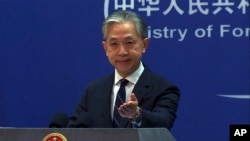A fragile thaw in U.S.-China relations is unlikely to significantly reduce tensions between Seoul and Beijing, experts said.
Stalled talks between the world’s two biggest economies were revived when Washington and Beijing agreed over the weekend to maintain high-level communication channels and to stabilize relations that had hit a low point after a suspected Chinese spy balloon flew across the continental U.S.
U.S. Secretary of State Antony Blinken said on Monday at a news briefing that his trip to Beijing on June 18-19 represented “progress.”
But Seoul’s close alignment with the U.S. on policies aimed at countering what both see as China’s challenges to a democratic values-based international system has made Beijing increasingly antagonistic toward its neighbor.
Chinese Ambassador to South Korea Xing Haiming on June 8 openly criticized Seoul, saying placing “wrong bets” in the U.S.-China rivalry would lead to “many difficulties” for South Korea.
South Korea’s First Vice Foreign Minister Chang Ho-jin summoned Xing a day later and expressed strong dissatisfaction over his remarks.
“The South Korean government has made known several times that its position in seeking South Korea-China bilateral relations is based on mutual respect, and China should also put efforts toward that direction,” a Foreign Ministry spokesperson told VOA’s Korean Service in a phone interview on Tuesday.
The Chinese Embassy in Washington told VOA’s Korean Service on Wednesday that any response to Seoul’s comments should be requested from the Chinese Foreign Ministry.
Chinese Foreign Ministry spokesperson Wang Wenbin said at a news briefing on June 13 “there is no point in making an issue” out of Xing’s remarks. He said, “A sound and steady China-ROK relationship serves the common interests of both sides.” South Korea’s official name is the Republic of Korea.
'Premature' to expect improvements
Daniel Russel, who served as the assistant secretary of state for East Asia and Pacific affairs during the Obama administration, said, “It’s premature to conclude that Blinken’s trip will produce a sustained improvement in the U.S.-China relations, let alone have an impact on the ROK-China relations.”
Russel said that “Washington’s partners seem to value” its efforts to reduce escalating tensions and “are confident about Washington’s resolve to push back against coercive and destabilizing behavior” of China.
Daniel Kritenbrink, assistant secretary of state for East Asia and Pacific affairs, visited Seoul on Wednesday to explain, as a member of the delegation, Blinken’s two-day meetings in Beijing.
Kritenbrink told Deputy Foreign Minister Choi Youngsam that the U.S. sought to maintain high-level communication channels with China to prevent any miscalculation from leading to an unwanted conflict.
He said the U.S. planned to continue its close cooperation with its allies including South Korea to defend a free and open Indo-Pacific and the rules-based international order.
South Korean First Vice Foreign Minister Chang Ho-jin, who also met with the assistant secretary of state, said Kritenbrink’s Seoul visit demonstrated close Washington-Seoul relations.
Dennis Wilder, senior director for East Asia affairs at the White House’s National Security Council during the George W. Bush administration, said diplomatic ties between Washington and Beijing were renewed a bit but still fragile. Military tensions remain high, with the Chinese military “aggressively monitoring U.S. air and naval activities in international waters near China’s coast,” he said.
In this context, he said, he does “not have a great deal of hope” that Beijing will become “less belligerent in its approaches to the Yoon administration” as “China is adamantly opposed to many of the policies of the Yoon government.”
South Korean President Yoon Suk Yeol said in April that the Taiwan issue was not simply a matter between China and Taiwan and that he opposed changing the status quo in Taiwan by using force.
China considers self-governing Taiwan as part of its territory and has ramped up its disruption of international navigation in the Taiwan Strait. On June 8, more than 35 Chinese military aircraft made incursions into the Taiwanese air defense zone, prompting the island’s military to activate its defense system.
China also has repeatedly intruded into South Korea’s air defense zone without warning. On June 6, South Korean jets chased away four Chinese and Russian military aircraft from its air defense zones.
The incident followed what the U.S. military said was an “unsafe” maritime move by a Chinese warship that came close to colliding with a U.S. destroyer exercising a freedom of navigation transit in the Taiwan Strait on June 3.
In a news conference on Monday, Blinken said that “China has not agreed” to restore military-to-military channels of communications that would help to avoid miscalculations leading into clashes.
Concerned by China’s increasingly aggressive military actions, the U.S. has been urging its allies and partners, including South Korea, to restrict the sale of high-end semiconductors that China can use to advance its military.
"Washington does not expect them to stop taking advantage of business opportunities in China,” Wilder said.
“That said, in those areas of emerging technologies where Washington is trying to halt leakage of key components, such as high-end semiconductors, the United States will want its allies and partners to be alert to any attempts by companies within their border to violate the restrictions.”
Blinken said in an interview with CBS News on Monday that the U.S. was not “trying to hold China back economically,” as that would be “profoundly against our own interests.”
However, he said, “it’s not in our interest to provide” or “sell” to China “sensitive technology that China is using to advance its own very opaque nuclear weapons program, to build hypersonic missiles, to create technology that can be used for repressive purposes.”
Kim Hyungjin contributed to this report.













